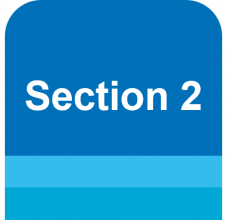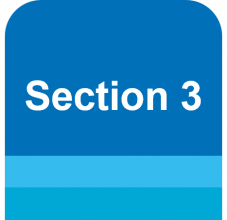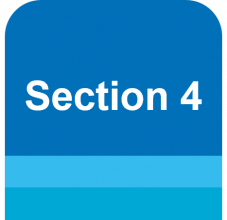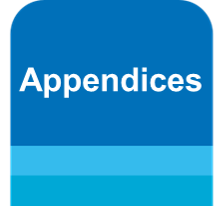Updated: November 2025
Contents

Download a full PDF of this information

Q 1.1 What funding is available for advanced practice training?
Answer: As of 1 April 2024, all NHS England – East of England funding for advanced practice training for new trainees is in the form of a training grant paid directly to the employer. Funding options are detailed in the table below are available for new advanced practice training funding applications (continuing trainees will remain on previously agreed funding models). Regardless of funding option, £2,600 of the total training grant paid each year must be used to support clinical supervision.
Table 1 – NHS England – East of England advanced practice funding options
|
Funding name |
Funding type |
Annual £ amount |
Length of funding |
Total £ amount |
|
Advanced practice MSc – 1 year (60 credits or less) |
Training grant |
£10,200
|
12 months |
£10,200 |
|
Advanced practice MSc – 2 years (more than 60 but less than 120 credits) |
Training grant |
£10,200
|
24 months |
£20,400 |
|
Advanced practice MSc – 3 years (120 credits up to 180) |
Training grant |
£10,200
|
36 months |
£30,600 |
Q 1.2 What funding is available for surgical care practitioner training?
Answer: Currently, the NHS England – East of England Faculty for Advancing Practice (hereby referred to as “Faculty” in the remainder of this document) are responsible for funding surgical care practitioner training. This is subject to change in future finance years; the funding options and the team responsible for this within NHS England – East of England may alter. The current funding option for new surgical care practitioner trainees is detailed in table below (continuing trainees will remain on previously agreed funding models).
Table 2 – NHS England – East of England surgical care practitioner funding options
|
Funding name |
Funding type |
Annual £ amount |
Length of funding |
Total £ amount |
|
Surgical care practitioner MSc |
Training grant |
£6,120 |
24 months |
£12,240 |
Q 1.3 How to choose the correct funding option
Answer: The funding option an employer should choose for a trainee is dependent on two factors:
- Is the trainee completing an advanced practice programme or a surgical care practitioner programme?
- If trainee is completing an advanced practice programme, how many credits does the trainee need to complete an MSc award at the point that funding is applied for?
Please use the table in Appendix 1 as a guide to choose the most appropriate funding option.
Q 1.4 What programmes are funded?
Answer: Only advanced practice programmes that will result in an MSc (level 7) award and have either been accredited by the NHS England Centre for Advancing Practice or map to the Multi-professional framework for advanced practice in England will be funded by the Faculty. The Faculty will consider funding programmes outside of region if in England, however a valid reason for not choosing a local education provider will need to be provided on funding application.
Q 1.5 What are the requirements to receive funding?
Answer: There are a set of requirements that an employer, the advanced practice trainee and the preferred training programme needs to meet before a successful funding application can be made to the Faculty. These are detailed in the table below.
Table 3 – Funding requirements
|
Employer |
Programme |
Trainee |
|
Provides an advanced practice training post during training Guarantees an advanced practice post on trainee qualification Provides clinical support and supervision Provides a named co-ordinating educational supervisor and supervision plan Provides a positive learning environment Has an identified advanced practice lead |
Is accredited by the Centre for Advancing Practice, or Is an advanced practice MSc that maps to the Multi-professional framework for advanced practice If out of region, has a valid reason why a local programme has not been chosen i.e. it is a speciality programme not provided in region
|
Meets entry criteria of chosen advanced practice programme Has a substantive contract with an employer who directly provides NHS commissioned services Works in an NHS commissioned service Will complete the NHS England trainee monitoring survey Will complete the National Education & Training Survey (NETS) Not undertaking the NHS England ePortfolio route* |
*The NHS England ePortfolio route is a funded route for experienced advanced practitioners seeking to acquire NHS England recognition that their existing education and training is equivalent to an accredited advanced practice MSc. Practitioners undertaking this route are not eligible for NHS England training grants, which are specifically designed to support advanced practice trainees to complete MSc (level 7) advanced practice programmes. More information about this route can be found here https://advanced-practice.hee.nhs.uk/our-work/eportfolio-route/.
Q 1.6 What stages are involved in advanced practice training funding?
Answer: There are four core stages involved in the process of NHS England funding advanced practice training:
- Organisations apply for funding based on indicative need (see Applying for funding)
- NHS England communicates funding intentions to organisations (see Confirming funding)
- Organisations confirm to NHS England actual funding need (see answer to Q 3.5)
- NHS England confirms and releases funding to organisations (see Payment of funding)
These stages are illustrated in the diagram below with approximated timelines.
Diagram 1 – Funding stages
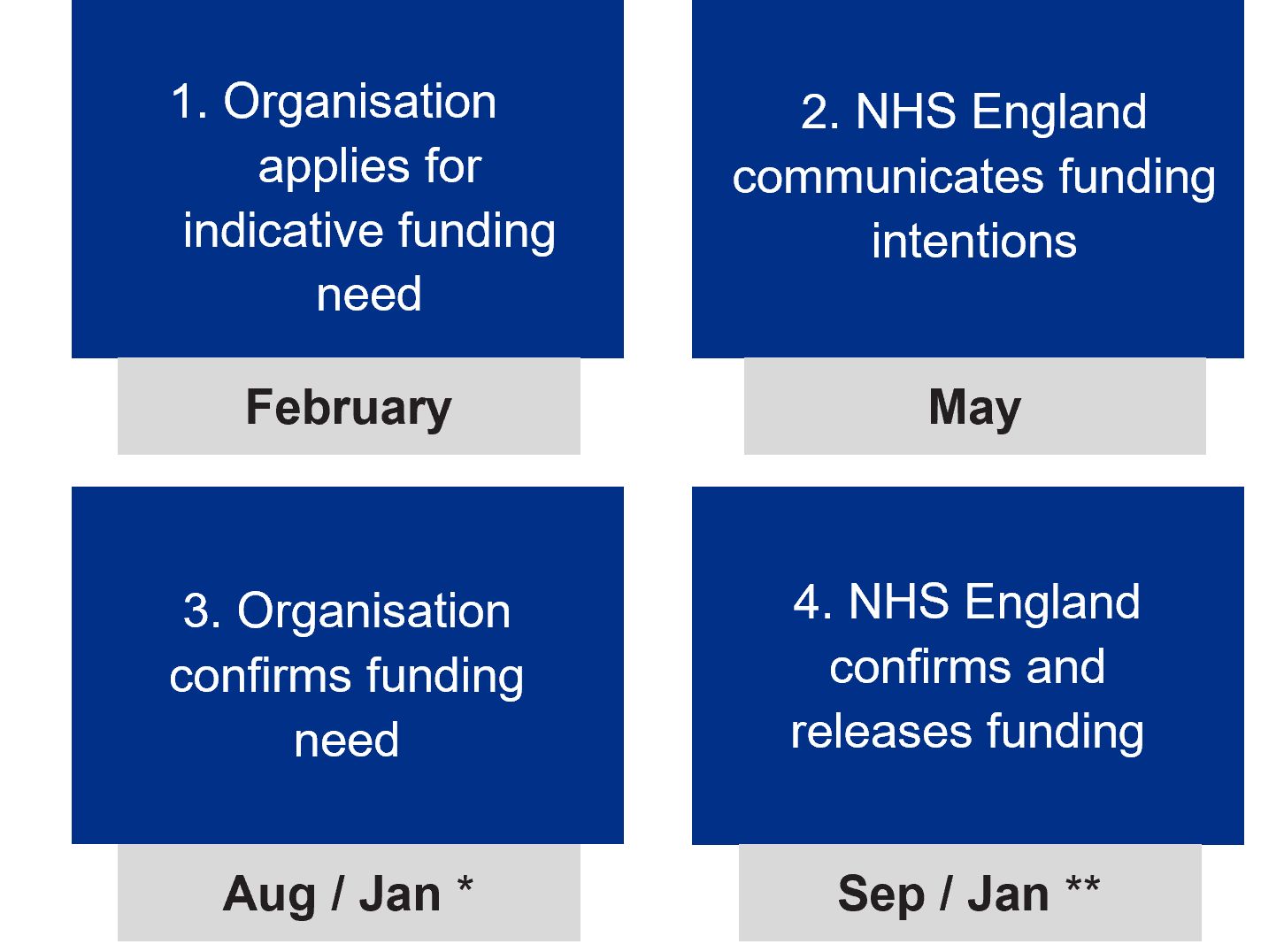
* Please see answer to Q 3.7 for further information
** Please see Q 4.2 for further information
Q 1.7 How are advanced practice roles funded?
Answer: Advanced practice job roles are not funded NHS England – East of England. Job roles should be funded from an employing organisation’s existing workforce budgets. In primary care, some qualified advanced practice roles can be funded via the Additional Roles Reimbursement Scheme (ARRS). Visit https://www.england.nhs.uk/gp/expanding-our-workforce/ for more information about the ARRS.
Q 1.8 How should the training grant be used?
Answer: £2,600 of the training grant must be used to support clinical supervision for each year the funding is paid. The remaining amount should be used to support the learning infrastructure of the trainee. Examples of how the training grant funding can be used are outlined in the diagram below.
Diagram 2 – Using the training grant to support learning infrastructure
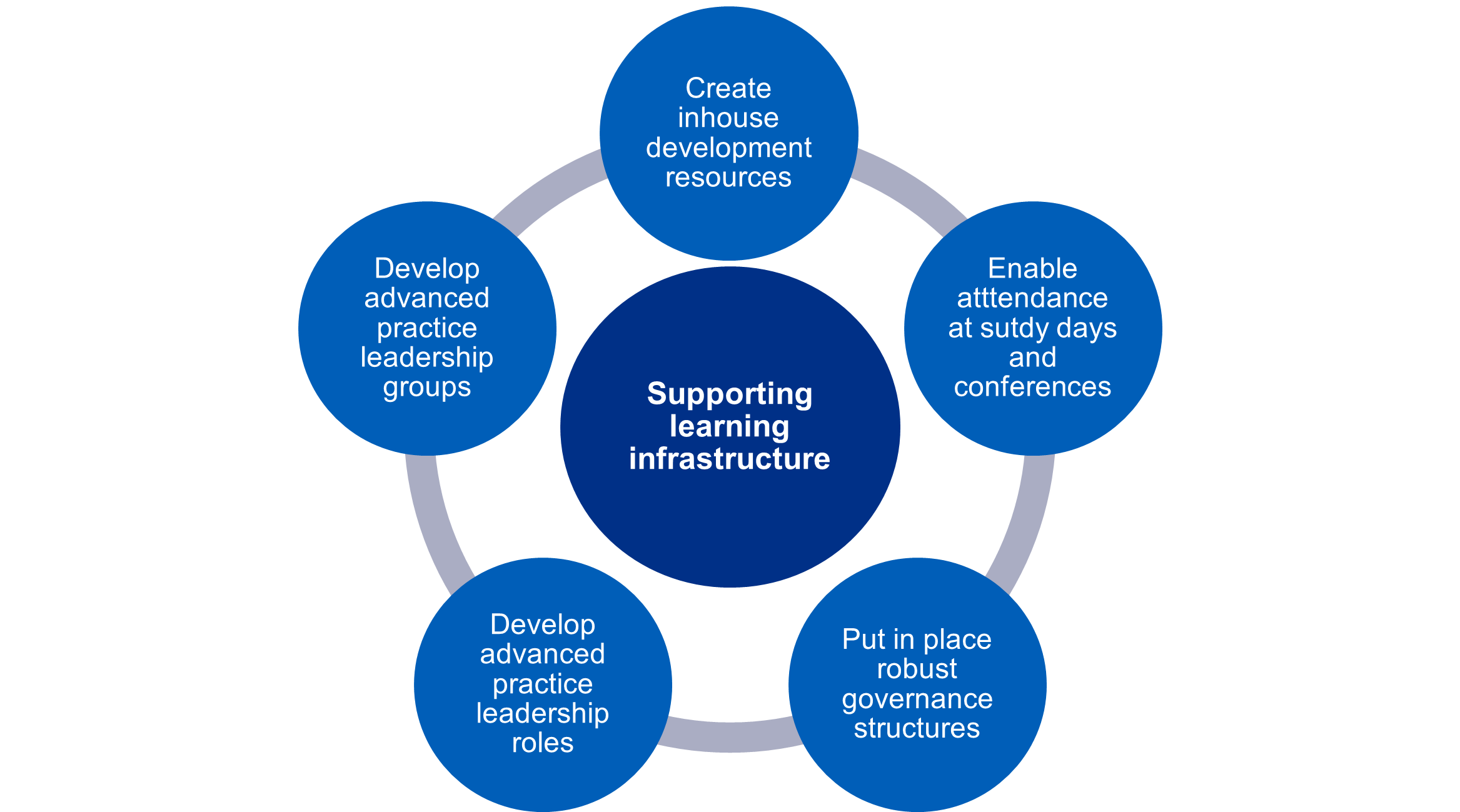
Q 1.9 Why is guarantee of an advanced practice role post-training required for funding?
Answer: The Faculty needs to ensure that the funding it invests in advanced practice training will lead to growth in the regional advanced practice workforce. If an employer is not able to guarantee an advanced practice role at the completion of training, the Faculty has no assurance that the public funding it paid out will result in an advanced practitioner being able to enter the local workforce. Further, undertaking advanced practice training without a guarantee of a job role on completion puts the practitioner at risk of becoming deskilled if they are not able to put their training into practice shortly after qualification. This can create retention issues for employers resulting from practitioners feeling dissatisfied with their roles and seeking advance practice employment opportunities elsewhere.
Q 1.10 Can funding be used for continued professional development (CPD)?
Answer: No. Funding from the Faculty should only be used to train registered healthcare professionals to become advanced practitioners. Funding should not be used for practitioners wanting to undertake training that will not lead to an advance practice role, see answer to Q 1.9 as to the reason for this.
Q 1.11 Can funding be used to complete modules before joining an advanced practice programme?
Answer: No. Funding from the Faculty is used to support trainees to undertake and complete a full advanced practice programme. It cannot be applied to cases where trainees are completing advanced practice modules but are not enrolled onto an advanced practice programme in the same finance year.

Q 2.1 How is funding applied for?
Answer: Applications for advanced practice training funding are submitted to the Faculty via a specific Excel template.
Q 2.2 When can funding be applied for?
Answer: The window to submit funding applications opens in February and closes in March of the same year. This will occur yearly.
Q 2.3 Who can submit funding applications?
Answer: In secondary care, an organisational advanced practice lead should be the only person within the organisation putting forward applications for advanced practice training funding. Within primary care, the local primary care training hub lead submits funding applications on behalf of primary care organisations within their catchment.
Direct applications from trainees, line managers, GP practice managers or department leads will not be accepted by the Faculty. To express an interest, contact your organisational/primary care training hub advanced practice lead. If you are unsure of who your organisational advanced practice lead or primary care training hub is please contact england.eoeapfaculty@nhs.net.
Q 2.4 Can changes be made to funding applications before the deadline closes?
Answer: Yes. The document used to collect funding applications is editable until the deadline and allows for corrections and changes.
Q 2.5 Can changes be made to funding applications after the deadline closes?
Answer: No. Once the deadline closes the document used to collect funding applications cannot be edited. If you have a change in a funding request after the survey has closed, please see answer to Q 3.4 on what process you will need to follow next.
Q 2.6 Can new funding applications be made after the deadline closes?
Answer: Once the February-March funding application window closes (see answer to Q 2.2), new funding applications cannot be made to the Faculty until October. In September the Faculty will review August utilisation returns (see answer to Q 3.6) and if there is sufficient underspend will open a second funding application round in October. If the Faculty does decide to open an October funding application round, the same principles and processes will apply as already described in Section 2.0.
Q 2.7 Are funding applications required for subsequent academic years?
Answer: No. Once the Faculty has agreed to fund a trainee, funding will continue for the length of the agreed funding model without the need to reapply for funding. Funding the Faculty has agreed would only stop prior to agreed funding model length where there is a failure to complete the trainee monitoring survey (see Trainee monitoring and its impact on funding) or the trainee withdraws from training or moves to a new employer that does not meet NHS England funding requirements (see Trainee changes and funding).
Q 2.8 What information is required in the application for funding?
Answer: The indicative details of trainees whose funding needs to start in the upcoming financial year (April to March) and who the Faculty have not previously agreed funding for, see answer to as to the reason for this. For an application to be considered, a minimum of 6 pieces of information about the trainee need to be provided. These are:
- Speciality area
- Integrated Care Board
- University
- Course start date
- Funding model required
- Pathway (i.e. non-apprenticeship or apprenticeship)

Q 3.1 How does NHS England confirm a funding application has been accepted?
Answer: The organisation or primary care training hub will receive an email from england.eoeapfaculty@nhs.net which will contain:
- An electronic letter attached outlining the conditions of funding.
- An Excel workbook which contains data on what funding has been indicatively agreed.
Q 3.2 When does NHS England confirm a funding application has been accepted?
Answer: Indicative funding for new advanced practice funding requests is usually confirmed in May each year.
Q 3.3 Is funding guaranteed after NHS England accepts a funding application?
Answer: No. When the Faculty agree indicative funding for new advanced practice trainees, the funding stated is conditional. Organisations or primary care training hub provide assurance to the Faculty that a trainee has successfully been recruited and will be starting their course on the date indicated in the application. To obtain this assurance, the Faculty require organisations and primary care training hubs to complete a funding utilisation return (see answer to Q 3.4) before funding will start to be paid to organisations and/education providers.
Q 3.4 What is a funding utilisation return and why must it be completed?
Answer: Organisations and training hubs are required to complete a funding utilisation return before NHS England – East of England will start payments of funding. The return is made using the same restricted SharePoint link to the Excel workbook that NHS England – East of England sends to confirm funding (see answer to Q 3.1).
The Faculty requires assurance that a trainee has successfully been recruited and is ready to start their course on the date indicated in the application of funding before it will start making payments to organisations and/education provider.
Q 3.5 How is the funding utilisation return completed?
Answer: The Faculty provides comprehensive instructions in a guidance sheet within the Excel workbook that organisations and primary care training hubs will use to complete the return. A step-by-step guide of how the Excel workbook is used to make a utilisation return can also be found in Appendix 2.
Q 3.6 When does a funding utilisation return need to be completed?
Answer: This is dependent upon the agree funding start date. This is outlined in the table below.
Table 4 – Funding utilisation return deadlines
|
Payment start |
Return deadline |
|
Between Apr and Jun |
Last weekday of May |
|
Between Sep and Oct |
Third Friday of Aug |
|
Between Jan and Mar |
Third Friday of Dec |
Q 3.7 Is a funding utilisation return required for previous years’ funding?
Answer: No. Funding utilisation returns only need to be made for new funding requests.
Q 3.8 How does NHS England decide which funding applications to accept?
Answer: When reviewing funding applications, the Faculty use a criterion when deciding whether to indicatively fund the request and which requests to prioritise where total amount of requests exceed the projected training budget for a given finance year. The criteria are:
- Has assurance been given that the conditions of funding have been met?
- Has the required minimum dataset been provided?
- Has a named trainee been identified?
- Is trainee working in a speciality /geographical area identified by NHS England as a priority for workforce growth?
- The organisation’s record of trainees exiting advanced practice programmes
- The organisation’s record of success in recruiting trainees to start advanced practice programmes

Q 4.1 How is funding paid out?
Answer: NHS England – East of England pay advanced practice training funding through invoicing. Organisations and institutions who the Faculty have agreed to provide funding with will receive instructions on how much to invoice for and when to submit invoices in a document called the Education Funding Agreement (see answer to Q 4.5).
Q 4.2 When is funding received?
Answer: Advanced practice funding is usually paid out in monthly instalments and NHS England – East of England will instruct organisations and institutions via the Education Funding Agreement (see answer to Q 4.5) to invoice in this pattern. Once NHS England – East of England receives and approves an invoice for advanced practice training, the payment is made to the organisation or education provider within 3 business days.
Q 4.3 What if a change has occurred that impacts funding?
Answer: It is imperative that the Faculty are informed of any changes that might impact payments for advanced practice training it has agreed to fund. If a change of circumstance happens before a trainee commences training, it is the responsibility of the employing organisation or primary care training hub to inform the Faculty – see answer to Q 3.4 for further instructions. Changes that happen after a trainee has already commenced training must be notified to the Faculty by the trainee – see Trainee changes and funding for further instructions.
Q 4.4 How to find out how much funding your organisation is receiving
Answer: Any advanced practice training funding an organisation or institution is in receipt of in a given finance year is detailed in the Education Funding Agreement sent by NHS England – East of England. This is an Excel document sent to a restricted distribution list within an organisation, which will include the senior responsible officer for finance. If you would like to find out how much funding your organisation is receiving from NHS England – East of England please contact your finance department. Any advanced practice training funding your organisation is receipt of will appear on the “Non-medical” sheet in the Education Funding Agreement and will be referenced with cost centre code 125431 – more detail of how this will appear in the document can be found in Appendix 3.
Q 4.5 What is the Education Funding Agreement?
Answer: The Education Funding Agreement is an Excel document that is used by NHS England – East of England to communicate to organisations and institutions how much workforce education training funding they will receive in a given finance year. It will include information advanced practice training funding – both for new trainees and continuing trainees. The document is issued at the beginning of each finance year (April) and is updated approximately 4 times a year to account for revisions and additions. An approximate timetable of when the Education Funding Agreement is issued and updated in a given finance year is in the table below.
Table 5 – Education Funding Agreement schedule timelines
|
Education Funding Agreement issue |
Release timeline |
|
First iteration (issue 1) |
April |
|
Issue 2 |
Last weekday of June |
|
Issue 3 |
Last weekday of September |
|
Issue 4 |
Last weekday of January |
|
Final iteration (issue 5) |
Last weekday of 3rd week of March |

Q 5.1 What if a trainee withdraws from training?
Answer: The trainee is required to complete and submit a notification of change form to the Faculty as soon as they know they will be withdrawing from the programme. The form will need to be countersigned by the trainee’s employer. The form can be downloaded from this webpage.
Where a trainee withdraws from a programme, funding that was being paid by NHS England – East of England to the employer or education provider will stop the month after their leave date. Funding will not be reinstated following a withdrawal.
Q 5.2 What if a trainee pauses their training?
Answer: The trainee is required to complete and submit a notification of change form to the Faculty as soon as they know when they will be pausing their programme. The Faculty must know about any pauses to programme, including pauses related to sickness, paternity/maternity leave, career breaks, etc. The form must be countersigned by the trainee’s employer. The form can be downloaded from this webpage. If the Faculty is made aware of a pause without receiving a completed notification of change form, it will contact the trainee to formally request a form is completed. The trainee will have 1 month from the date the Faculty made the request to complete the form, otherwise funding that was being paid by NHSE – East of England to their employer will stop.
Where a trainee pauses programme, funding that was being paid by NHS England – East of England to the employer or education provider will stop the month after their pause date. Funding will be reinstated the month after their return date and the payment end date will be extended to account for the number of months payments missed due to the pause.
For the Faculty to pause funding a return date (estimated or known) must be provided at the point of notification. In cases where a return date is unknown funding will stop and the employer must reapply to the Faculty for funding when the trainee returns to programme.
The Faculty will agree to pause funding for up to 1 year. Pauses to training over 1 year must be reviewed by the Faculty on a case-by-case basis. The Faculty will not agree to pause funding for 2 years or more. Where this occurs funding will stop and the employer must reapply to the Faculty for funding when the trainee returns to programme.
Where a trainee has had long or numerous pauses during their programme, it is the joint responsibility of the employer and the education provider to determine whether the trainee has acquired sufficient workplace training to successfully complete the programme. In such cases it may be beneficial, or necessary, for the employer, education provider and trainee to create a tripartite action plan to ensure the required competencies are achieved before an award is issued.
Q 5.3 What if a trainee moves to a different employer within region during training?
Answer: The trainee is required to complete and submit a notification of change form to the Faculty as soon as they know when they will be moving to their new employer. The form must be countersigned by the trainee’s current and new employer. The form can be downloaded from this webpage.
If the Faculty is made aware of a change of employer without receiving a completed notification of change form, it will contact the trainee to formally request a form is completed. The trainee will have 1 month from the date the Faculty made the request to complete the form, otherwise funding that was being paid by NHSE – East of England to their employer will stop.
It is not guaranteed that NHS England funding will transfer with the trainee. Each notification of change form will be reviewed on a case-by-case basis.
Where a trainee moves to another employer within the East of England (and where the new employer is eligible to receive funding for advanced practice training (see answer to Q 1.5), funding will stop being paid to the former employer and start being paid to the new employer the month after their contract end date.
If funding was being paid to the education provider instead of the employer, the funding will continue to be paid to the education provider. See answer to Q 5.4 for advice on trainees moving to employers outside of the east of England.
Where trainees are moving into an area of practice (as part of their change of employer) different from the area their existing education, training and experience is in, this must be indicated on the notification of change form. In such cases, the Faculty will not move NHS England funding to the new employer until it has received tripartite assurance from the trainee, the new employer and the education provider that the trainee remains eligible to complete the advanced practice programme. The Faculty will require completion of a tripartite learning needs analysis and learning plan to address any gaps identified in training and experience required to meet the competencies and capabilities of the new area of practice
Q 5.4 What if a trainee moves to a different employer outside of region during training?
Answer: The trainee is required to complete and submit a notification of change form to the Faculty as soon as they know when they will be moving to their new employer. The form must be countersigned by the trainee’s current and new employer. The form can be downloaded from this webpage. The Faculty will share the completed form with the NHS England Regional Faculty for Advancing Practice responsible for trainee’s new region.
Where a trainee moves to another employer outside theEast of England, funding from NHS England – East of England will stop the month after the contract end date at their current employer. There is no guarantee that NHS England funding will continue after this date; currently each NHS England region’s funding rules differ for advanced practice training and the NHS England Regional Faculty for Advancing Practice within the trainee’s new region will decide whether the trainee and their new employer are eligible for continued funding.
Q 5.5 What if a trainee moves to a different education provider during training?
Answer: The trainee is required to complete and submit a notification of change form to the Faculty as soon as they know when they will be moving to their new education provider. The form must be countersigned by the trainee’s current and new employer. The form can be downloaded from this webpage. If the Faculty is made aware of a change of education provider without receiving a completed notification of change form, it will contact the trainee to formally request a form is completed. The trainee will have 1 month from the date the Faculty made the request to complete the form, otherwise funding that was being paid by NHSE – East of England to their employer will stop.
It is not guaranteed that NHS England funding will transfer to the new education provider. Each notification of change form will be reviewed on a case-by-case basis. If a trainee moves to a new education provider programme that is ineligible for NHS England – East of England’s funding (see answer to Q 1.5), funding will stop the month after the trainee moves to the new programme and funding will not be reinstated. If the trainee moves to an eligible education provider programme, funding will continue after the move date but who is being paid may change depending on the specific scenario. See diagram on next page for further information.
If a new education provider does not recognise the module credits completed at the previous university and requires the trainee to repeat or complete additional modules, NHS England will not provide additional funding above what has already been agreed.
Diagram 3 – Funding payment changes when a trainee moves education provider
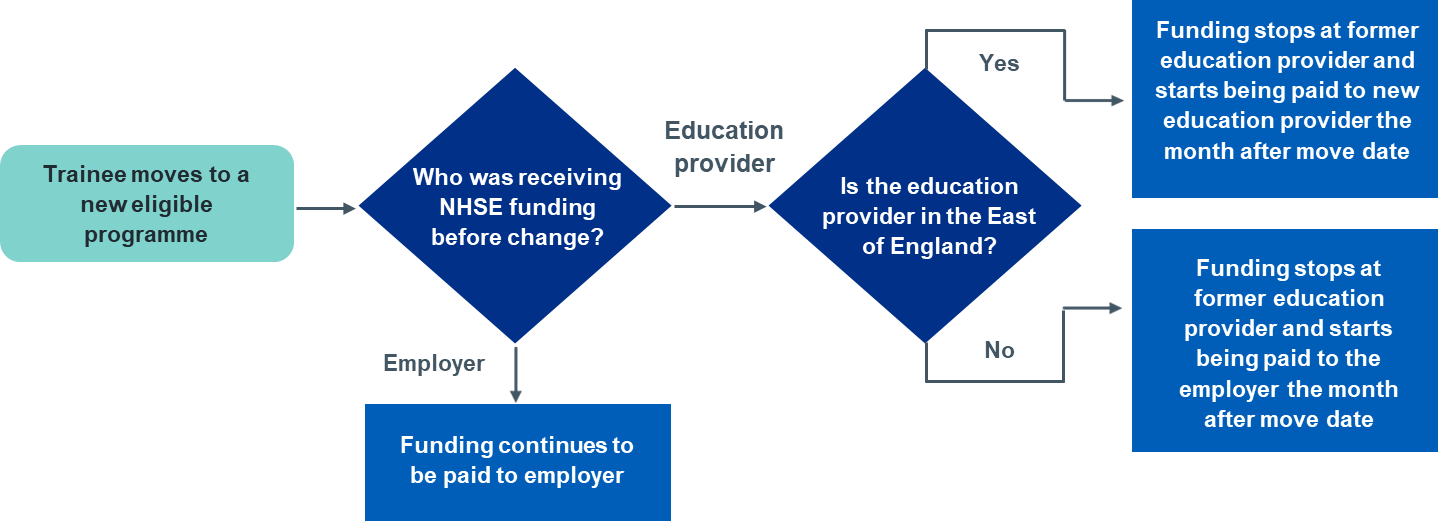
Q 5.6 What if a trainee delays the start of their training?
Answer: If a trainee needs to delay the start of their training programme the trainee is required to inform their employer as soon as possible. The employer must inform the Faculty of this change by completing the utilisation return (see answer to Q 3.5 for further instructions). A notification of change form is not needed in cases where a trainee delays the start of their programme.

Q 6.1 What is the trainee monitoring survey and how is the data utilised?
Answer: This is an online survey that the Faculty send directly to all NHSE funded trainees on advanced practice programmes. The purpose of the survey is to monitor the progression of trainees to ensure that funding payments reflect actual trainee activity. The survey is also used to collect demographic data about trainees so that NHS England can monitor the level of equality, diversity and inclusivity of the advanced practice trainees it is funding.
Q 6.2 When is the trainee monitoring survey sent?
Answer: The exact date the survey is sent changes year-on-year, but the month remains the same. The survey is first sent when a trainee starts their programme, and sent once a year subsequently whilst they are active students. See diagram in Q 6.3 for further information.
Q 6.3 When does the trainee monitoring survey close?
Answer: Each time the survey is sent (see answer to Q 6.2) trainees will be given 6 weeks to complete the survey. The survey takes on average 10 minutes to complete.
Below is timeline of when the trainee monitoring survey is sent:
- In June or July a survey is sent to all active trainees
- In October a survey is sent to new trainees starting between April and November
- In February a survey is sent to new trainees starting between January and March
Q 6.4 What questions are asked in the training monitoring survey?
Answer: The survey asks questions about the trainee, their employer and the programme they are completing. More detail is provided in the table below:
Table 6 – Questions asked in the trainee monitoring survey
|
Trainee |
Employment |
Programme |
|
Name |
Organisation name |
University name |
|
Date of birth |
Site of work |
Programme name |
|
Email address |
Working hours |
Start date |
|
Profession |
Supervisor name |
End date |
|
Registration number |
Supervisor email |
Current year of study |
|
Fitness to practice |
Advanced practice lead name |
|
|
Scope of practice |
Role on completion? |
|
|
Demographics |
|
|
Q 6.5 Who receives the trainee monitoring survey?
Answer: The survey is sent by the Faculty via email to trainees who are completing advanced practice programmes and are being funded by NHS England – East of England.
Q 6.6 What happens if the trainee monitoring survey is not completed?
Answer: It is a requirement of the Faculty’s funding (see Funding options and requirements) that a trainee completes the trainee monitoring survey. If a trainee does not complete the survey by the deadline (see answer to Q 6.3) funding will be withdrawn from the month the survey closed e.g. if survey closed in October and trainee did not respond, funding will be withdrawn from October.
Q 6.7 What is the NETS and is it different to the trainee monitoring survey?
Answer: The National Education and Training Survey (NETS) is an annual NHS England survey open to all healthcare trainees completing training programmes in England. The NETS is a different survey to the trainee monitoring survey for advanced practitioners.
The NETS gathers anonymous feedback on trainees’ academic and work based experienced and is open to any healthcare trainee in any part of England. The NETS is the only national survey open to all undergraduate and postgraduate students and trainees undertaking a practice placement or training post in healthcare as part of their education and training programme. The survey gathers opinions from students and trainees about their time working and training in practice placements and training posts, asking them to provide feedback on what worked well and what they think could be improved. Every survey response, across every profession and location, counts and helps to improve the experience of current and future students and trainees.
Conversely, the trainee monitoring survey for advanced practitioners collects trainees’ personal information and academic progress and is only open to advanced practitioner trainees being funded by NHS England – East of England. This ensures that NHS England – East of England funding payments reflect actual trainee activity and aids future regional workforce planning.
A table that compares the key similarities and differences between the NETS and the trainee monitoring survey for advanced practitioners can be found in Appendix 4.

Q 7.1 What is the apprenticeship mitigation fund and how is it accessed?
Answer: Prior to January 2026, employers accessed the apprenticeship levy to pay for training costs for staff completing advanced practice degree apprenticeships. As of January 2026, the Department of Education removed access for several level 7 apprenticeships (including advanced practice programmes) for people aged 22 and older. To mitigate for this, the Department of Education have agreed funding that employers can access to cover the training costs for trainees undertaking level 7 apprenticeship programmes that start between finance years 2026/27, 2027/28 and 2028/29. In the East of England, this funding is managed by the Faculty and can be applied for as part of its existing processes – see “Applying for funding”. The eligibility criteria for this funding mirrors the Faculty’s existing requirements – see answer to Q 1.5. The mitigation funding is in line with historical levy price and will be £12,000 total per trainee to be paid at £4,000 per annum over 3 years.
Q 7.2 Can apprentices receive NHS England funding?
Answer: Yes. NHS England – East of England will fund trainees on advanced practice apprenticeship programmes who meet the funding eligibility criteria (see answer to Q 1.5). Trainees on advanced practice apprenticeship programmes can attract the Faculty’s training grant (see answer to Q 1.1) in addition to the Department of Education apprenticeship mitigation fund (see answer to Q. 7.1).

Appendix 1 – Choosing the right funding option
|
Funding name |
Scenario for use |
|
Advanced practice MSc – 1 year |
Trainees completing an advanced practice programme who need 60 credits or less to complete with an MSc award at the point funding is applied for |
|
Advanced practice MSc – 2 years |
Trainees completing an advanced practice programme who need more than 60 credits but less than 120 to complete with an MSc award at the point funding is applied for |
|
Advanced practice MSc – 3 years |
Trainees completing an advanced practice programme who need 120 credits up to 180 credits to complete with an MSc award at the point funding is applied for |
|
Surgical care practitioner MSc |
Trainees completing a surgical care practitioner programme
|
Appendix 2 – How funding utilisation returns are completed
Context
NHS England – East of England use Excel workbooks shared with organisational advanced practice leads to maintain a shared record with organisations of all advanced practice training funding requests and agreements, new and previous.
Content of workbook
A detailed guide to the content of the Excel workbook is outlined in the table below.
|
Column title / reference |
Purpose of column |
Who completes column |
|
Request number – A |
Records the finance year of the request and its number in relation to the total number of requests from organisation for that year e.g., “2024/24 1” means request 1 of 2024/25 |
NHS England |
|
NHS ENGLAND unique trainee ID – B |
A unique ID that NHS England applies to the funding request |
NHS England |
|
Stage of request/funding – C |
Column has four rows per funding request to records the four stages of funding for a given funding request i.e., starting from what was initially requested by an organisation, to what was finally offered by NHS England. See answer to Q 1.6 for more information about funding stages. |
Organisations complete rows that reference “Org. final request”, NHS England complete rows that reference “NHS England” |
|
Funding model required – D |
The funding model that the organisation has requested and/or NHS England has decided to apply during each stage of the funding request |
Organisations complete rows that reference “Org. final request”, NHS England complete rows that reference “NHS England” |
|
Trainee ICB/S region – E |
ICB/S that the funding request relates to (i.e., where trainee works) |
Organisations complete rows that reference “Org. final request”. |
|
Trainee employing organisation/training hub – F |
Employing organisation/training hub that the funding request is from |
Organisations complete rows that reference “Org. final request”. |
|
Trainee forename – G |
Name of trainee that the funding request relates to. Organisation may change details between funding request stages. |
Organisations complete rows that reference “Org. final request”. |
|
Trainee surname – H |
Name of trainee that the funding request relates to. Organisation may change details between funding request stages. |
Organisations complete rows that reference “Org. final request”. |
|
Trainee email address – I |
Email of trainee that the funding request relates to. Organisation may change details between funding request stages. |
Organisations complete rows that reference “Org. final request”. |
|
Trainee department – J |
Department of trainee that the funding request relates to. Organisation may change details between funding request stages. |
Organisations complete rows that reference “Org. final request”. |
|
Trainee site (of work) – K |
Work site of trainee that the funding request relates to. Organisation may change details between funding request stages. |
Organisations complete rows that reference “Org. final request”. |
|
Trainee speciality – L |
Speciality of trainee that the funding request relates to. Organisation may change details between funding request stages. |
Organisations complete rows that reference “Org. final request”. |
|
Trainee profession – M |
Profession of trainee that the funding request relates to. Organisation may change details between funding request stages. |
Organisations complete rows that reference “Org. final request”. |
|
Trainee named supervisor – N |
Co-ordinating educational supervisor of trainee that the funding request relates to. Organisation may change details between funding request stages. |
Organisations complete rows that reference “Org. final request”. |
|
Trainee education provider – O |
University of trainee that the funding request relates to. Organisation may change details between funding request stages. |
Organisations complete rows that reference “Org. final request”. |
|
Trainee course name – P |
Course name of trainee that the funding request relates to. Organisation may change details between funding request stages. |
Organisations complete rows that reference “Org. final request”. |
|
Trainee pathway – Q |
Is the trainee the funding request relates to undertake a direct-entry MSc or an apprenticeship degree route? Organisation may change details between funding request stages. |
Organisations complete rows that reference “Org. final request”. |
|
When did/does trainee start course? – R |
Approx course start date of trainee that the funding request relates to. Organisation may change details between funding request stages. |
Organisations complete rows that reference “Org. final request”. |
|
When will trainee complete course? – S |
Approx course end date of trainee that the funding request relates to. Organisation may change details between funding request stages. |
Organisations complete rows that reference “Org. final request”. |
|
Comments – T |
Additional information that the organisation or NHS England may want to record between funding stages. |
Organisations complete rows that reference “Org. final request”, NHS England complete rows that reference “NHS England” |
|
Payment start date – U |
NHS England uses this to confirm month funding will start |
NHS England |
Stages involved in completing a funding utilisation return
Step 1 – Organisation’s indicative requests for a given finance year are added to organisation’s restricted Excel workbook by NHS England – East of England in rows with reference “Org. indicative request” in column C. These rows are then locked by NHS England for audit purposes.
Step 2 – NHS England – East of England confirms indicative funding offer for a given finance year (based on organisation’s indicative funding application) using rows with reference “NHS England indicative funding request” in column C. These rows are then locked by NHS England for audit purposes.
Step 3 – For a given finance year, organisations are required to complete all empty cells in rows with reference “Org. final request” in column B by NHS England – East of England’s funding utilisation return deadlines (see answer to Q 3.6). This is done to provide assurance to NHS England – East of England that either a) the funding will be used for its original indictive purpose, b) if it will be used differently or c) it will not be used at all.
Step 4 – NHS England – East of England confirms final funding offer for a given finance year (based on organisation’s final request, as per Step 3) using rows with reference “NHS ENGLAND final funding offer” in column C.
Appendix 3 – Advanced practice training funding in NHS England Education Funding Agreement
Any advanced practice training funding your organisation is in receipt of will appear on the sheet titled “Non medical” in the Education Funding Agreement and will be referenced with cost centre code 125431 in column A “Cost Centre”.
The programme the funding relates to (i.e. advanced practice) is also detailed in column J “Speciality” and column K “Education Contract Details” (see image below). The type of funding (e.g. training grant, tuition, etc.) is detailed in column L “Cost category” (see image below).
Each row in the sheet represents funding being attracted by a learner and their name will be recorded in column P and Q.
The amount of funding they are attracting from NHS England – East of England annually is in column V “Annual Rate” and the monthly amounts are detailed between columns AK-AV.
Appendix 4 – Similarities and differences between the National Education Training Survey (NETS) and the trainee monitoring survey
|
|
Trainee monitoring survey |
NETS |
|
Accessibility |
Survey accessed without password |
Survey accessed without password |
|
Timeframe |
6 weeks |
8 weeks |
|
Format |
Microsoft Form |
SmartSurvey |
|
Questions |
Trainee’s personal information, employment information and academic progress |
Trainee’s profession and employment information and their academic and work-based learning experience. |
|
Completion time |
10 minutes |
15 minutes |
|
How data is used |
Monitor progress of, and manage funding for, training |
To identify areas of improvement for clinical learning environments |
|
Established |
2022 |
2018 |
|
Managed by |
NHS England Regional Faculty for Advancing Practice |
NHS England Regional Quality and NHS England National NETS Team |
|
Sent to |
NHS England funded all advanced practice trainees |
All undergraduate and postgraduate healthcare trainees |

Download a full PDF of this information

